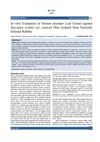 4 citations,
April 2019 in “Cell Stem Cell”
4 citations,
April 2019 in “Cell Stem Cell” Certain immune cells in the skin can stop hair from growing.
 October 2021 in “Journal of Investigative Dermatology”
October 2021 in “Journal of Investigative Dermatology” COVID-19 infection rates were low in patients with immune diseases, regardless of their treatment type.
 116 citations,
August 2010 in “Nature”
116 citations,
August 2010 in “Nature” Scientists turned rat thymus cells into stem cells that can help repair skin and hair.
 July 2021 in “Journal Für Ästhetische Chirurgie”
July 2021 in “Journal Für Ästhetische Chirurgie” Effective hair loss treatments require medical diagnosis and realistic expectations, with hair transplants offering improved, natural-looking results.
 November 2023 in “Hair transplant forum international”
November 2023 in “Hair transplant forum international” Caffeine can stimulate hair growth, but the best dose and frequency for hair loss treatment are still unknown.
3 citations,
November 1998 in “Pediatrics in review” For hair fungal infections, take oral antifungals; for skin and nail infections, use topical antifungals, and keep affected areas cool and dry.
2 citations,
June 2016 in “International journal of experimental pathology” Human skin has less GDNF and its receptor with age.
 August 2023 in “Journal of The American Academy of Dermatology”
August 2023 in “Journal of The American Academy of Dermatology” Valproic acid, a common antiepileptic medication, can cause reversible hair loss in patients.
 109 citations,
September 2011 in “Human molecular genetics online/Human molecular genetics”
109 citations,
September 2011 in “Human molecular genetics online/Human molecular genetics” New treatments targeting specific genes show promise for treating keratin disorders.
 4 citations,
August 2011 in “Aktuelle Dermatologie”
4 citations,
August 2011 in “Aktuelle Dermatologie” Topical melatonin is a safe treatment that may reduce hair loss in people with androgenetic alopecia.
 June 2019 in “The Egyptian Journal of Fertility and Sterility”
June 2019 in “The Egyptian Journal of Fertility and Sterility” Chromium picolinate was better tolerated than metformin for PCOS with fewer side effects.
 3 citations,
January 2014 in “Elsevier eBooks”
3 citations,
January 2014 in “Elsevier eBooks” Different stem cells have benefits and challenges for tissue repair, and more research is needed to find the best types for each use.
 17 citations,
January 2011 in “The Korean Journal of Hepatology”
17 citations,
January 2011 in “The Korean Journal of Hepatology” Vogt-Koyanagi-Harada disease can develop during interferon therapy for chronic hepatitis C.
 5 citations,
February 2011 in “Aesthetic Plastic Surgery”
5 citations,
February 2011 in “Aesthetic Plastic Surgery” The new technique for repositioning lower eyelid fat with a midface lift is easier, faster, and has better results with fewer complications.
 1 citations,
September 2018 in “European Journal of Cancer Prevention”
1 citations,
September 2018 in “European Journal of Cancer Prevention”  21 citations,
June 2022 in “Molecules”
21 citations,
June 2022 in “Molecules” Perilla frutescens, an East Asian plant, contains 400 bioactive compounds that have various health benefits, including anti-inflammatory, antidepressant, and anticancer effects, and can treat conditions like diabetes, skin allergies, and neurological disorders.
 30 citations,
August 2016 in “Advances in radiation oncology”
30 citations,
August 2016 in “Advances in radiation oncology” Researchers developed a mouse model that successfully mimics the bladder damage seen in humans after radiation therapy.
 7 citations,
October 2013 in “Methods in molecular biology”
7 citations,
October 2013 in “Methods in molecular biology” These methods help understand DNA changes in mouse skin.
 4 citations,
March 2021 in “Parasitology Research”
4 citations,
March 2021 in “Parasitology Research” Besnoitiosis, a parasitic disease, has been found in donkeys in Italy and may be more common in Europe than previously thought.
 64 citations,
November 2012 in “EMBO reports”
64 citations,
November 2012 in “EMBO reports” Lamins are vital for cell survival, organ development, and preventing premature aging.
 January 2024 in “Indian Journal of Animal Research”
January 2024 in “Indian Journal of Animal Research” Nerium oleander leaf extract effectively kills scabies mites in rabbits.
 3 citations,
January 2011 in “Intestinal Research”
3 citations,
January 2011 in “Intestinal Research” Cronkhite-Canada syndrome can cause multiple gastrointestinal polyps and various physical symptoms.
 February 2024 in “International Journal For Multidisciplinary Research”
February 2024 in “International Journal For Multidisciplinary Research” Nanostructured lipid carriers are effective for treating hyperpigmentation in women aged 30-40.
 72 citations,
April 2008 in “The Journal of urology/The journal of urology”
72 citations,
April 2008 in “The Journal of urology/The journal of urology” Dutasteride and finasteride do not significantly affect bone density, blood fats, or blood production, but slightly lower PSA levels and minimally impact sexual function in healthy young men.
13 citations,
April 2019 in “International journal of molecular sciences” Acyzol could help treat conditions caused by zinc deficiency.
 1 citations,
January 2020 in “Research Square (Research Square)”
1 citations,
January 2020 in “Research Square (Research Square)” Inherited color dilution in Rex rabbits is linked to DNA methylation changes in hair follicles.
 May 2024 in “Skin research and technology”
May 2024 in “Skin research and technology” Certain metabolites can either protect against or increase the risk of hair loss.
 October 2022 in “International journal of research and review”
October 2022 in “International journal of research and review” A man had severe stomach issues after a dental treatment with Formacresol, which improved with a different medication.
 10 citations,
January 2014 in “BioMed research international”
10 citations,
January 2014 in “BioMed research international” Rat whisker cells can help turn other cells into nerve cells and might be used to treat brain injuries or diseases.
 December 2023 in “Journal of the Endocrine Society”
December 2023 in “Journal of the Endocrine Society” Blocking glucocorticoid receptors improves glucose metabolism in a PCOS mouse model.



























